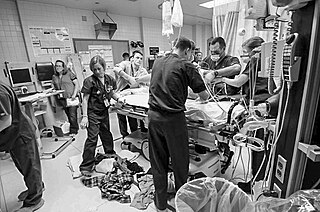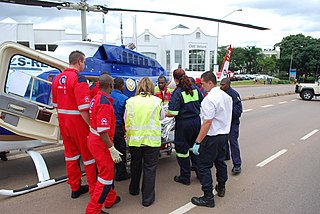Related Research Articles

Medicine is the science and practice of caring for a patient, managing the diagnosis, prognosis, prevention, treatment, palliation of their injury or disease, and promoting their health. Medicine encompasses a variety of health care practices evolved to maintain and restore health by the prevention and treatment of illness. Contemporary medicine applies biomedical sciences, biomedical research, genetics, and medical technology to diagnose, treat, and prevent injury and disease, typically through pharmaceuticals or surgery, but also through therapies as diverse as psychotherapy, external splints and traction, medical devices, biologics, and ionizing radiation, amongst others.

Emergency medicine is the medical speciality concerned with the care of illnesses or injuries requiring immediate medical attention. Emergency physicians specialize in providing care for unscheduled and undifferentiated patients of all ages. As first-line providers, in coordination with emergency medical services, they are primarily responsible for initiating resuscitation and stabilization and performing the initial investigations and interventions necessary to diagnose and treat illnesses or injuries in the acute phase. Emergency medical physicians generally practice in hospital emergency departments, pre-hospital settings via emergency medical services, and intensive care units. Still, they may also work in primary care settings such as urgent care clinics.

Emergency medical services (EMS), also known as ambulance services or paramedic services, are emergency services that provide urgent pre-hospital treatment and stabilisation for serious illness and injuries and transport to definitive care. They may also be known as a first aid squad, FAST squad, emergency squad, ambulance squad, ambulance corps, life squad or by other initialisms such as EMAS or EMARS.

A paramedic is a healthcare professional trained in the medical model, whose main role has historically been to respond to emergency calls for medical help outside of a hospital. Paramedics work as part of the emergency medical services (EMS), most often in ambulances. They also have roles in emergency medicine, primary care, transfer medicine and remote/offshore medicine. The scope of practice of a paramedic varies between countries, but generally includes autonomous decision making around the emergency care of patients.
In the medical profession, a general practitioner (GP) or family physician is a physician who treats acute and chronic illnesses and provides preventive care and health education to patients of all ages. GPs' duties are not confined to specific fields of medicine, and they have particular skills in treating people with multiple health issues. They are trained to treat patients to levels of complexity that vary between countries. The term "primary care physician" is more usually used in the US. In Asian countries like India, this term has been replaced mainly by Medical Officers, Registered Medical Practitioner etc.

Primary care is the day-to-day healthcare given by a health care provider. Typically this provider acts as the first contact and principal point of continuing care for patients within a healthcare system, and coordinates other specialist care that the patient may need. Patients commonly receive primary care from professionals such as a primary care physician, a physician assistant, a physical therapist, or a nurse practitioner. In some localities, such a professional may be a registered nurse, a pharmacist, a clinical officer, or an Ayurvedic or other traditional medicine professional. Depending on the nature of the health condition, patients may then be referred for secondary or tertiary care.
International emergency medicine is a subspecialty of emergency medicine that focuses not only on the global practice of emergency medicine but also on efforts to promote the growth of emergency care as a branch of medicine throughout the world. The term international emergency medicine generally refers to the transfer of skills and knowledge—including knowledge of ambulance operations and other aspects of prehospital care—from developed emergency medical systems (EMSs) to those systems which are less developed. However, this definition has been criticized as oxymoronic, given the international nature of medicine and the number of physicians working internationally. From this point of view, international emergency medicine is better described as the training required for and the reality of practicing the specialty outside of one's native country.
A medical director is a physician who provides guidance and leadership on the use of medicine in a healthcare organization. These include the emergency medical services, hospital departments, blood banks, clinical teaching services, and others. A medical director devises the protocols and guidelines for the clinical staff and evaluates them while they are in use.

Emergency medical services in South Africa are a public/private system aimed at the provision of emergency ambulance service, including emergency care and transportation to hospital.
Healthcare in England is mainly provided by the National Health Service (NHS), a public body that provides healthcare to all permanent residents in England, that is free at the point of use. The body is one of four forming the UK National Health Service as health is a devolved matter; there are differences with the provisions for healthcare elsewhere in the United Kingdom, and in England it is overseen by NHS England. Though the public system dominates healthcare provision in England, private health care and a wide variety of alternative and complementary treatments are available for those willing and able to pay.
A clinical officer (CO) is a gazetted officer who is qualified and licensed to practice medicine.
In South Africa, private and public health systems exist in parallel. The public system serves the vast majority of the population. Authority and service delivery are divided between the national Department of Health, provincial health departments, and municipal health departments.
The Colleges of Medicine of South Africa (CMSA) is the custodian of the quality of medical care in South Africa. It is unique in the world in that its 29 constituent Colleges represent all the disciplines of medicine and dentistry. The only present route to specialisation in South Africa, is via a Fellowship conferred by the college. See Medical education in South Africa; Dental degree § South Africa.

The International Pharmaceutical Students' Federation (IPSF) is a non-governmental, non-political and non-religious organisation that represents pharmaceutical students, pharmacy students and recent graduates from all over the world. It was founded in 1949 and it is the oldest faculty-based student organisation. IPSF represents over 500,000 individuals in more than 100 countries with 127 different representative pharmacy student member organisations.

Health professional requisites refer to the regulations used by countries to control the quality of health workers practicing in their jurisdictions and to control the size of the health labour market. They include licensure, certification and proof of minimum training for regulated health professions.

The International Federation for Emergency Medicine (IFEM) is an organisation promoting international emergency medicine around the world. It is a consortium of over 70 national and regional emergency medicine organisations. IFEM organises the International Conference on Emergency Medicine (ICEM).
The World Association for Disaster and Emergency Medicine (WADEM) is an international organization concerned with disaster medicine. Originally named the Club of Mainz, it was founded on October 2, 1976. It has hosted the World Congress on Disaster and Emergency Medicine every two years since 1979. Additionally, it publishes the peer-reviewed journal Prehospital and Disaster Medicine.
Frances Rix Ames was a South African neurologist, psychiatrist, and human rights activist, best known for leading the medical ethics inquiry into the death of anti-apartheid activist Steve Biko, who died from medical neglect after being tortured in police custody. When the South African Medical and Dental Council (SAMDC) declined to discipline the chief district surgeon and his assistant who treated Biko, Ames and a group of five academics and physicians raised funds and fought an eight-year legal battle against the medical establishment. Ames risked her personal safety and academic career in her pursuit of justice, taking the dispute to the South African Supreme Court, where she eventually won the case in 1985.
Midwives in South Africa are nurses who focus on the care of pregnant women and the delivery of babies. Midwives have the ability to work independently in cases of healthy pregnancies and problem-free deliveries; however, they can refer patients to gynaecologists or obstetricians when complications are diagnosed. The majority of pregnant women in South Africa use the public healthcare system, and most of this care is provided by midwives.

Lee Alan Wallis is the South African Head of Emergency Medicine for the Western Cape Government, Professor and Head of the Division of Emergency Medicine at the University of Cape Town and Stellenbosch University, and the founding President of the African Federation for Emergency Medicine.
References
- ↑ Health Professions Council of South Africa
- ↑ Practice Guidelines issued by EMSSA to Date
- ↑ "Emergency Medicine in the developing world Congress". Archived from the original on 2009-10-04. Retrieved 2009-11-28.
- ↑ EMSSA Objectives